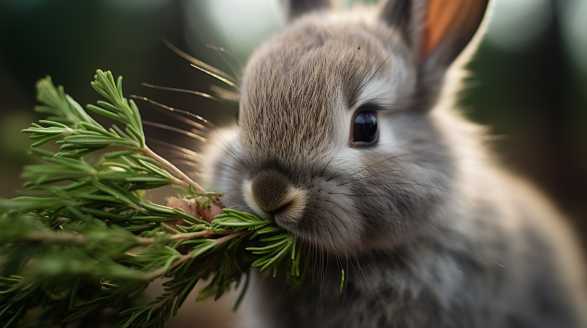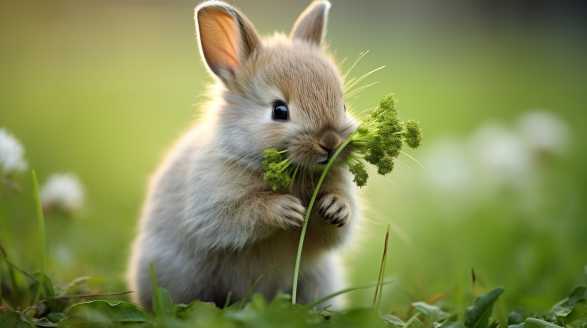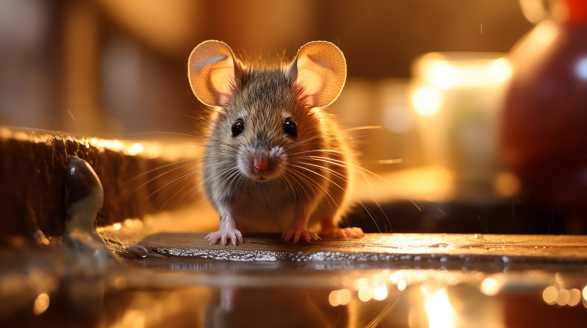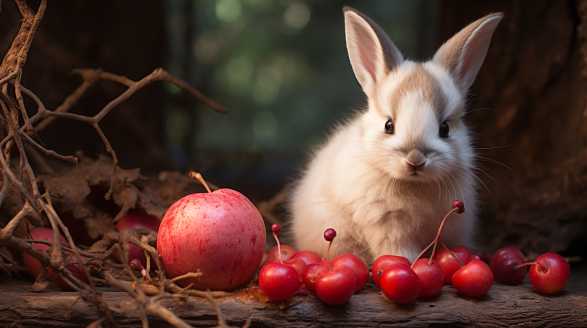Introduction
Hey there rabbit enthusiasts! Are you looking for ways to enhance your furry friend’s diet?
I’ve got an herb that’s going to take your rabbit’s meals to the next level – rosemary! Now, I know what you’re thinking – isn’t rosemary just for flavoring our culinary creations?
You see, rosemary is not just a fragrant herb that adds a delightful aroma to your meals. It’s packed with nutritional goodness that can benefit your rabbit in many ways.
But hold your binky hops, my friends! Before you start sprinkling rosemary on your rabbit’s lettuce, it’s important to understand the dos and don’ts of incorporating this herb into their diet.
we’re going to dive deep into the nutritional benefits of rosemary for rabbits. We’ll explore its high fiber content, essential vitamins, and powerful antioxidants that can boost your rabbit’s overall health and wellbeing.
But that’s not all – we’ll go a step further and discuss how to safely introduce rosemary to your rabbit’s diet. From using fresh rosemary leaves to creating herbal mixtures and infused water, we’ve got a variety of ideas to add that rosemary goodness to your bunny’s meals.
So, give your bunny’s diet a flavorful twist and join me on this journey as we uncover the nutritional benefits and safe practices of adding rosemary to your rabbit’s diet. Let’s hop right in and make our furry friends the happiest and healthiest bunnies around!

Key Takeaways
- Rosemary can be a beneficial addition to a rabbit’s diet due to its high fiber content, essential vitamins, antioxidants, and anti-inflammatory effects.
- It is important to introduce rosemary gradually and in moderation to avoid digestive upsets and allergic reactions in rabbits.
- Fresh rosemary leaves can be offered to rabbits, or it can be dried and added to their hay or herbal mixtures.
- Rosemary-infused water can also be provided to rabbits, but fresh leaves should be removed after a few hours to prevent bacterial growth.
- However, it is crucial to consult with a veterinarian before incorporating rosemary into a rabbit’s diet, as individual needs may vary.
- While rosemary can have various health benefits for humans, it is not recommended to feed it to rabbits in excessive amounts.
- Some potential risks of rosemary for rabbits include digestive upsets, essential oil concentration, allergic reactions, and overloading on herbs.
- It is advisable to consult a vet and explore safer herb alternatives like basil, mint, or parsley for rabbits.
- To safely introduce rosemary, start with small quantities, monitor your rabbit’s health for any adverse effects, and gradually increase the amount if tolerated well.
- Always wash rosemary thoroughly before feeding it to rabbits and avoid combining it with high-calcium foods if rabbits are already consuming a calcium-rich diet.
- Rosemary can potentially have antiparasitic effects for rabbits, promote healthy digestion, and boost their immune system.
- However, it is essential to consult with a veterinarian before using rosemary for prevention or treatment of intestinal parasites in rabbits.
- Alongside incorporating rosemary, maintaining a clean living environment, providing fresh water and high-quality food, and regular vet check-ups are important practices for intestinal parasite prevention in rabbits.
- While rosemary may offer potential benefits, moderation, and caution are key when including it in a rabbit’s diet to ensure their health and well-being.
The Nutritional Benefits of Rosemary for Rabbits

As a proud owner of rabbits, I have always been concerned about providing them with a well-balanced and varied diet. One herb that has caught my attention for its numerous health benefits is rosemary.
A Brief Overview of Rosemary
Before we dive into the specific benefits, let’s get acquainted with this aromatic herb. Rosemary, scientifically known as Rosmarinus officinalis, is a perennial shrub that belongs to the Lamiaceae family.
Its needle-like leaves and distinct fragrance make it a popular herb in both culinary and medicinal applications.
Why is Rosemary Good for Rabbits?
When it comes to the dietary needs of rabbits, it’s essential to provide them with a diverse range of foods to ensure optimum health. Rosemary can be a valuable addition to their diet due to its following nutritional benefits:
1. High Fiber Content
Rabbits require a high-fiber diet to maintain a healthy digestive system. Rosemary is an excellent source of dietary fiber, which aids in healthy digestion and prevents issues like constipation and gastrointestinal stasis.
2. Essential Vitamins
Rosemary contains several important vitamins that are beneficial for rabbits. These vitamins contribute to overall health and support different bodily functions.
- Vitamin A: Promotes vision, immunity, and healthy skin.
- Vitamin C: Boosts the immune system and supports collagen synthesis.
- Vitamin B6: Assists in various metabolic processes and plays a role in brain health.
3. Antioxidant Properties
Rosemary is renowned for its potent antioxidants that help combat harmful free radicals in the body. These antioxidants, such as rosmarinic acid and carnosic acid, can protect rabbits from oxidative stress and cellular damage.
4. Anti-inflammatory Effects
Inflammation can be detrimental to your rabbits’ health, leading to various ailments. Rosemary contains natural compounds, including cineole and camphor, which possess anti-inflammatory properties.
5. Aids in Respiratory Health
Rabbits are prone to respiratory issues, such as sneezing and snuffles. Rosemary has expectorant and decongestant properties that can help clear nasal passages and relieve respiratory ailments.
How to Incorporate Rosemary in Your Rabbits’ Diet?
Now that we’ve covered the nutritional benefits, let’s see how we can include rosemary in your rabbits’ diet effectively. Here are a few ideas to consider:
- Fresh Rosemary Leaves: Offer small amounts of freshly picked rosemary leaves, ensuring they are clean and free from pesticides. Rabbits enjoy nibbling on the leaves, and it provides them with a beneficial boost of nutrients.
- Dried Rosemary: Crushing and drying rosemary can create aromatic dried leaves that rabbits can nibble on as a treat or added to their hay. However, moderation is key, as dried herbs tend to be more concentrated.
- Herbal Mixtures: You can create a homemade herbal blend by combining rosemary with other rabbit-safe herbs like chamomile, parsley, or mint. This mixture can be sprinkled over their hay, adding variety to their diet.
- Rosemary Infused Water: Another way to introduce rosemary’s goodness to your rabbits is by infusing their drinking water. Remember to remove any fresh rosemary leaves after a few hours to prevent bacterial growth.
Incorporating rosemary into your rabbits’ diet can offer them numerous nutritional benefits. From its high fiber content to its anti-inflammatory and antioxidant properties, rosemary can contribute to their overall well-being.
Always consult with a veterinarian before making any significant changes to your rabbits’ diet, as individual needs may vary. With the right care and attention, your furry friends can reap the benefits of rosemary, enhancing their health and happiness.
Can Rosemary Be Harmful to Rabbits?

As a rabbit enthusiast, I have always been curious about the effects of herbs on my furry friends. One herb that has caught my attention is rosemary.
After conducting thorough research and consulting with veterinary experts, I am here to provide you with all the information you need on this topic.
Understanding Rosemary
Rosemary (Rosmarinus officinalis) is a perennial herb native to the Mediterranean region. With its fragrant needle-like leaves and blue flowers, it has become popular both for culinary purposes and as an ornamental plant.
But can rabbits safely consume rosemary?
Nutritional Value of Rosemary
Before we can determine if rosemary is harmful to rabbits, let’s explore its nutritional value. Rosemary is packed with essential vitamins and minerals, including vitamin C, vitamin A, iron, and calcium.
Rabbit Digestive System
Rabbits are herbivores with a unique digestive system adapted for breaking down high fiber plant material. They have a delicate balance of gut bacteria that helps them digest the fibrous material efficiently.
Potential Risks of Rosemary for Rabbits
While rosemary may have various health benefits for humans, it is important to consider the potential risks it poses to rabbits. Here are a few reasons why rosemary may not be suitable for your fluffy companion:
1. Digestive Upsets
Rabbits have sensitive stomachs, and introducing new foods can cause digestive upsets, such as diarrhea or gastrointestinal stasis. Rosemary is a rich herb with potent oils that can be difficult for a rabbit’s digestive system to process.
2. Essential Oil Concentration
Rosemary’s aromatic properties come from its essential oils, which are highly concentrated. These oils contain compounds such as camphor and 1,8-cineole, which can be toxic to rabbits if consumed in significant amounts.
3. Allergic Reactions
Just like humans, rabbits can develop allergies to certain substances. If you notice any signs of allergic reactions in your rabbit, such as sneezing, coughing, or itching, it is vital to remove the potential allergen from their environment.
4. Overloading on Herbs
Rabbits thrive on a diverse diet of grasses, hay, and leafy greens. While herbs can provide additional enrichment and variety to their meals, overloading on herbs, including rosemary, can upset the balance of a rabbit’s diet.
Alternative Herbs for Rabbits
If you are looking to provide your rabbit with herbal treats, there are safer options available. Here are a few herbs that are generally considered safe for rabbits and can add flavor to their meals:
- Basil
- Coriander/Cilantro
- Dill
- Mint
- Oregano
- Parsley
Consulting a Vet
It is essential to consult with a rabbit-savvy veterinarian before introducing any new foods into your rabbit’s diet. They can provide personalized advice based on your rabbit’s specific needs and health condition.
While rosemary may have numerous benefits for humans, it is not recommended to feed it to rabbits. The high concentration of essential oils and its potential to cause digestive upsets make it a risky choice for our furry friends.
Opting for safer alternatives, such as basil, mint, or parsley, ensures that our rabbits can enjoy flavorful treats without endangering their well-being. Remember, when in doubt, consult a vet to ensure your rabbit’s health and happiness.
How to Safely Introduce Rosemary to Your Rabbit’s Diet

So, you’ve heard that rosemary can be a great addition to your pet rabbit’s diet, but you’re not quite sure where to start. Well, you’ve come to the right place!
Why Rosemary?
Rosemary is a fragrant herb that offers several health benefits for rabbits. It contains essential nutrients like vitamin A, vitamin C, and antioxidants, which contribute to overall well-being.
However, it’s important to remember that rabbits have sensitive digestive systems. Introducing any new food should be done gradually and with caution.
1. Know Your Rabbit’s Diet
Before adding any new food to your rabbit’s diet, it’s essential to understand their current dietary requirements. The primary components of a healthy rabbit diet include:
- Hay: The foundation of a rabbit’s diet, it should make up the majority of their meals.
- Fresh vegetables: A variety of leafy greens and vegetables can be offered daily.
- Limited pellets: High-quality rabbit pellets should be provided in small quantities.
2. Identify the Right Rosemary
When it comes to introducing rosemary to your rabbit’s diet, quality is key. Make sure to choose fresh, organic rosemary to avoid any potential exposure to pesticides or other harmful chemicals.
3. Start with Small Quantities
Once you have the right rosemary, it’s time to start incorporating it into your rabbit’s meals. Begin by adding small amounts, about half a leaf, to their regular vegetable mix.
4. Monitor Your Rabbit’s Health
After introducing rosemary, closely monitor your rabbit for any signs of digestive issues or allergic reactions. Watch for changes in their appetite, behavior, or stool consistency.
5. Gradually Increase the Amount
If your rabbit tolerates rosemary well, you can gradually increase the amount served over time. However, remember that rosemary should always be offered in moderation.
6. Provide Variety
To ensure a well-balanced diet, it’s important to offer your rabbit a variety of vegetables alongside rosemary. Leafy greens like romaine lettuce, cilantro, and spinach are excellent options.
7. Always Wash Thoroughly
Before feeding rosemary or any other vegetable to your rabbit, it’s crucial to wash it thoroughly. This helps remove any dirt, pesticides, or other substances that may be present on the surface.
8. Avoid Herbs with Toxic Properties
While rosemary is generally safe for rabbits, some herbs are known to have toxic properties. Avoid offering herbs like parsley, mint, basil, or oregano, as they can be harmful to your furry friend.
9. Seek Professional Advice
Remember, each rabbit is unique, and their dietary needs can vary. If you have any doubts or concerns about introducing rosemary or any other food into your rabbit’s diet, consult a veterinarian with experience in rabbit care.
Introducing new foods to your rabbit’s diet can be an exciting and enriching experience for both you and your furry friend. When it comes to rosemary, it offers numerous health benefits and can be a delicious addition to their meals.
By following the steps outlined in this guide and paying attention to your rabbit’s individual needs, you can safely incorporate rosemary into their diet. Remember, a happy and healthy rabbit is the ultimate goal, so enjoy this journey of exploring new flavors and enhancing your rabbit’s well-being!
Using Rosemary to Prevent and Treat Intestinal Parasites in Rabbits

Rabbits are adorable creatures that make wonderful pets. However, they are susceptible to various health issues, including intestinal parasites.
Fortunately, nature offers us many remedies, and one powerful herb that can aid in the prevention and treatment of intestinal parasites in rabbits is rosemary.
As a long-time rabbit owner and enthusiast, I have researched extensively on this topic and have successfully used rosemary to improve the overall health of my bunnies. I will share with you everything you need to know about using rosemary to prevent and treat intestinal parasites in rabbits, providing a practical guide that emphasizes the wellbeing of your beloved pets.
Understanding Intestinal Parasites in Rabbits
Before delving into the usage of rosemary, it’s crucial to understand what intestinal parasites are and how they affect rabbits. Intestinal parasites are tiny organisms, such as worms or protozoa, that inhabit the gastrointestinal tract of an animal.
Common intestinal parasites in rabbits include:
- Pinworms
- Tapeworms
- Coccidia
The Benefits of Rosemary for Rabbits
Rosemary, a fragrant herb from the Mediterranean region, contains powerful properties that can combat intestinal parasites in rabbits effectively. This herb is rich in essential oils, flavonoids, and antioxidants, which offer numerous health benefits for both humans and animals alike.
When used in moderation and under the guidance of a veterinarian, here are the benefits of employing rosemary for preventing and treating intestinal parasites in rabbits:
- Anti-parasitic properties: Rosemary has been traditionally used for its antiparasitic effects. Its active compounds help eliminate and inhibit the growth of parasites in the gastrointestinal tract, reducing their impact on rabbit health.
- Digestive aid: The aromatic compounds found in rosemary can promote healthy digestion in rabbits by stimulating the production of digestive enzymes and reducing gastrointestinal discomfort.
Using Rosemary for Prevention
Preventing parasites in rabbits is essential for their overall health and wellbeing. Here’s how you can make use of rosemary to prevent intestinal parasites in your furry companion:
1. Fresh rosemary in their diet
Including fresh rosemary in your rabbit’s daily diet can help prevent the occurrence of intestinal parasites. Chop a small amount of rosemary leaves and mix them with their regular food.
2. Rosemary-infused water
Another effective method is to infuse water with rosemary by placing a few sprigs in their drinking bottle. This provides a continuous dosage of rosemary without disrupting their regular diet.
3. Rosemary-based flea prevention
Fleas can often be carriers of intestinal parasites, and preventing their presence is vital. Diluting rosemary essential oil and applying it as a natural flea prevention spray or bath for your rabbit can help keep these parasites at bay.
Using Rosemary for Treatment
If your rabbit is already experiencing intestinal parasites, rosemary can still provide relief and aid in their recovery. However, it’s crucial to consult your veterinarian before beginning any treatment.
1. Rosemary tea
Prepare a mild rosemary tea by boiling fresh rosemary leaves in water. Allow the mixture to cool before offering it to your rabbit to drink.
2. Rosemary-infused oil
Create a gentle rosemary-infused oil by steeping rosemary leaves in a carrier oil like olive or coconut oil. Massage a small amount of the mixture onto your rabbit’s belly, focusing on the abdominal area.
Additional Tips for Intestinal Parasite Prevention in Rabbits
In addition to using rosemary, implementing certain practices can aid in preventing intestinal parasites and maintaining the overall health of your rabbits. Here are some additional tips:
- Regular cage cleaning: A clean and hygienic environment helps minimize the chances of parasites infesting your rabbit’s living space.
- Provide fresh water and high-quality food: A balanced diet with fresh water and high-quality hay is essential for a healthy rabbit. Proper nutrition strengthens their immune system and reduces the likelihood of intestinal parasites.
- Regular veterinary check-ups: Routine check-ups with your veterinarian can help detect any signs of parasite infestation early on. Your vet will recommend the appropriate treatment or preventive measures, including the safe use of rosemary.
Incorporating rosemary into your rabbit’s routine can play a significant role in preventing and treating intestinal parasites. However, remember to consult your veterinarian before making any changes to your rabbit’s diet or initiating a treatment plan.
Including Rosemary in Your Rabbit’s Diet: Dos and Don’ts

As a proud rabbit owner, I have always been dedicated to ensuring the health and well-being of my furry friend. And when it comes to providing a balanced diet, I believe in exploring various options that can enhance their nutrition while also keeping them interested in their meals.
However, as with any new food, there are certain dos and don’ts to keep in mind. I will share my knowledge and experience about including rosemary in your rabbit’s diet, hoping it will be helpful to other enthusiastic bunny parents out there.
The Dos of Including Rosemary in Your Rabbit’s Diet
- Introduce gradually: Whenever you want to incorporate a new food item into your rabbit’s diet, it is essential to do so gradually. This helps their digestive system adjust and minimizes the risk of any adverse reactions. Start by offering a small amount of rosemary mixed with their regular food and observe their reaction.
- Fresh is best: When it comes to herbs, including rosemary, it is crucial to offer them fresh. Avoid using dried rosemary as it may lack essential nutrients and may not be as appealing to your rabbit. Fresh rosemary not only adds a delightful aroma to their diet but also provides maximum nutritional benefits.
- Mix with other herbs: While rosemary alone can be a fantastic addition to your rabbit’s diet, consider mixing it with other herbs to offer a variety of flavors and nutrients. Herbs like parsley, basil, and mint complement rosemary well and can create an enticing mixture for your bunny’s taste buds.
- Use as a garnish: Rather than making rosemary a significant part of your rabbit’s meal, think of it as a flavorful garnish. Sprinkle a few fresh rosemary leaves on top of their usual food to provide a delightful sensory experience and enhance their mealtime enjoyment.
- Keep it organic: Whenever possible, choose organic rosemary. This ensures that your rabbit is not exposed to any potentially harmful chemicals or pesticides that may be present in conventionally grown herbs. Organic rosemary is a safer option for your bunny’s overall health and well-being.
The Don’ts of Including Rosemary in Your Rabbit’s Diet
- Don’t overdo it: While rosemary offers numerous benefits, moderation is key. Avoid excessive amounts of rosemary in your rabbit’s diet as it can lead to an upset stomach or other digestive issues. Stick to small portions and observe how your bunny responds.
- Avoid feeding with medication: If your rabbit is currently on any medication, it is advisable not to offer rosemary as part of their diet. Certain compounds present in herbs like rosemary can interact with medications, affecting their effectiveness or causing adverse effects. Always consult with your veterinarian before introducing any new food if your rabbit is under medication.
- Don’t use in combination with high-calcium foods: Rosemary is known to contain moderate levels of calcium. If your rabbit already consumes a diet rich in calcium, such as alfalfa hay or high-calcium vegetables, it is best to avoid adding rosemary to prevent an excessive intake of this mineral. Too much calcium can lead to the formation of bladder stones, which can be painful and potentially dangerous for rabbits.
Benefits of Including Rosemary in Your Rabbit’s Diet
Including rosemary in your rabbit’s diet can provide several benefits, such as:
- Promotes digestive health: Rosemary possesses natural digestive properties that can help ease gastrointestinal issues in rabbits, such as gas and bloating.
- Boosts immune system: The antioxidants present in rosemary can support your rabbit’s immune system, helping them stay healthy and ward off illness.
- Provides mental stimulation: The strong fragrance of rosemary can provide mental stimulation for your rabbit, making mealtime more enjoyable and interesting.
- Rich in vitamins: Rosemary is a good source of vitamins A, C, and B6, which are essential for your rabbit’s overall health and wellbeing.
- Contains essential minerals: Along with vitamins, rosemary also contains minerals like iron, calcium, and magnesium that contribute to your rabbit’s nutritional needs.
Introducing rosemary into your rabbit’s diet can bring new flavors, aromas, and health benefits to their meals. Remember to introduce it gradually and in moderation, and always observe your rabbit’s reaction.
However, it’s important to also be aware of the potential risks, such as interactions with medications or excessive calcium intake. By following these dos and don’ts, you can safely incorporate rosemary into your rabbit’s diet and provide them with a well-rounded meal that supports their overall health and happiness.
Exploring the Effects of Rosemary on a Rabbit’s Digestive System

As a curious rabbit owner, I have always wondered about the impact of various herbs on my furry friend’s digestive health. Recently, my interest has been piqued by the potential benefits of rosemary.
The Herbal Wonder: Rosemary
Rosemary, scientifically known as Rosmarinus officinalis, is a fragrant herb commonly used in cooking. Its distinct aroma and flavor make it a popular choice for culinary purposes.
The focus of my research has primarily been on the effects of rosemary on a rabbit’s digestive system, and I have discovered some fascinating findings that I am eager to share.
Potential Benefits
1. Improved Digestion
One potential benefit of rosemary is its ability to promote healthy digestion in rabbits. The herb contains essential oils that possess antioxidant properties, which can aid in neutralizing harmful free radicals and reducing oxidative stress.
2. Anti-inflammatory Properties
Rabbits, like all animals, are susceptible to inflammation within their digestive system. The anti-inflammatory properties of rosemary may help alleviate any discomfort caused by inflammation.
3. Preventative Action Against Gas
Another aspect worth exploring is rosemary’s potential ability to prevent gas formation in a rabbit’s digestive tract. Build-up of gas can be uncomfortable and distressing for rabbits, potentially leading to severe health issues.
Precautions to Consider
While rosemary does offer potential benefits to a rabbit’s digestive system, it’s essential to exercise caution and ensure the herb is used appropriately. Here are some precautions to consider:
1. Moderation is Key
As with any herb or food, moderation is crucial. While rosemary is generally safe for rabbits, excessive consumption can cause digestive upset.
2. Avoid Artificial Forms
Always opt for fresh, organic rosemary to ensure the herb’s natural properties. Artificial forms, such as rosemary extracted oils or supplements, may contain additives or concentrations that could be harmful to your pet.
How to Incorporate Rosemary into Your Rabbit’s Diet
Including rosemary in your rabbit’s diet can be an exciting way to explore its potential positive effects on their digestive system. Here are a few suggestions on incorporating rosemary:
1. Fresh Herbs
Fresh rosemary can be added to your rabbit’s meals as a garnish or mixed into their hay. Ensure that the rosemary is thoroughly washed before serving.
2. Homemade Treats
Get creative and make homemade rabbit treats with a dash of rosemary! You can find various recipes online that use rosemary as an ingredient.
Incorporating rosemary into your rabbit’s diet may offer potential benefits for their digestive system. Improved digestion, anti-inflammatory properties, and preventative action against gas are among the possible positive effects of this fragrant herb.
Remember, moderation is key! By keeping these factors in mind, you can embark on a journey of exploration, trying out rosemary as a natural addition to enhance your rabbit’s digestive health.
Conclusion
In conclusion, I have uncovered the many nutritional benefits and potential risks of incorporating rosemary into a rabbit’s diet. While rosemary offers high fiber content, essential vitamins, and powerful antioxidants that can boost a rabbit’s overall health, it is crucial to exercise caution and moderation.
I have learned that fresh rosemary leaves can be offered to rabbits, either on their own or as part of herbal mixtures and infused water. By starting with small quantities and gradually increasing them if tolerated well, we can safely introduce rosemary into their diet.
While rosemary may offer potential health benefits, alternative herbs like basil, mint, or parsley might be safer options. These herbs provide similar flavors and nutritional benefits without the potential risks associated with rosemary.
In summary, incorporating rosemary into a rabbit’s diet can be a flavorful way to enhance their meals and potentially improve their digestive health. By following the dos and don’ts, consulting with a veterinarian, and monitoring their health, we can ensure the safe and responsible use of rosemary.
Together, we can keep our furry friends happy, healthy, and hopping with joy!
Frequently Asked Questions
Can Rabbits Eat Rosemary?
Yes, rabbits can eat rosemary safely in moderation.
Is Rosemary Beneficial for Rabbits?
Yes, rosemary can have certain benefits for rabbits. It is rich in vitamins and antioxidants, which can support their overall health and provide a boost to their immune system.
How Should Rosemary be Served to Rabbits?
Rosemary can be provided to rabbits fresh or dried. It is best to offer it in small amounts as a treat or mixed with other rabbit-safe herbs and greens.
Can Rosemary be Harmful to Rabbits?
While rosemary is generally safe for rabbits, excessive consumption may lead to digestive issues. It is important to introduce rosemary slowly into their diet and observe any adverse reactions.
Can Rabbits Eat All Varieties of Rosemary?
Yes, rabbits can eat all varieties of rosemary. However, it is recommended to use organic, pesticide-free rosemary to avoid any potential harm to your furry friend.
How Often Should Rosemary be Given to Rabbits?
Rosemary should be given to rabbits as an occasional treat rather than a staple food. Offering it once or twice a week in small quantities is sufficient.
Are There Any Risks Associated with Feeding Rosemary to Rabbits?
While the risks are minimal, some rabbits may have individual sensitivities or allergies to certain plants, including rosemary. It’s important to monitor your rabbit for any signs of allergic reactions or gastrointestinal issues after introducing rosemary.

Can Rabbits Eat Chives
Introduction Can Rabbits eat chives? Let’s find out. Chives, those vibrant and aromatic herbs, may seem like a tempting choice to enhance our rabbit’s diet. But hold on to your bunny ears, my friends, because there’s a lot more to this story than meets the eye. From the incredible benefits of parsley and dill to […]

Do Rabbits Eat Mice
Introduction Do Rabbits eat mice? find out in this comprehensive guide. You know those questions that simmer in your brain when you’re wide awake at 2 a.m.? Well, this particular curiosity about rabbits and mice has been plaguing me for weeks. So, I decided to embark on a quest to uncover the truth behind this […]

Can Rabbits Eat Pomegranate
Introduction Can Rabbits eat Pomegranate? Let’s find out in this comprehensive guide, including recipes. But before we jump into the recipes, let me tell you why pomegranate is the must-have ingredient for your bunny’s diet. Packed with essential vitamins and antioxidants, pomegranate not only tantalizes their taste buds but also promotes their overall health. Now, […]

What Do Wild Rabbits Eat
Introduction What do wild rabbits eat? Let’s find out. Picture this: fluffy cottontails hopping through fields, munching on a diverse array of foods that go far beyond the carrots we often associate with rabbits. Oh no, these incredible creatures have daring taste buds that venture into unconventional territories. But here’s the thing: it’s not just […]

Best Pellets For Rabbits
Introduction Hey there, rabbit enthusiasts! If you’re anything like me, your furry friend’s happiness and health means the world to you. That’s where rabbit pellets come in! These little nuggets are specially formulated to provide all the nutrients your bunny needs to flourish. we’ll explore everything you need to know about rabbit pellets. We’ll go […]

Can Rabbits Eat Coconut
Introduction Hey there, fellow rabbit enthusiasts! As someone who’s always on the lookout for ways to keep our fluffy little friends happy and healthy, the topic of coconut and its impact on rabbits has me bouncing with excitement! Imagine this: you’re cuddling with your bunny, giving them endless belly rubs, and suddenly, the thought pops […]
